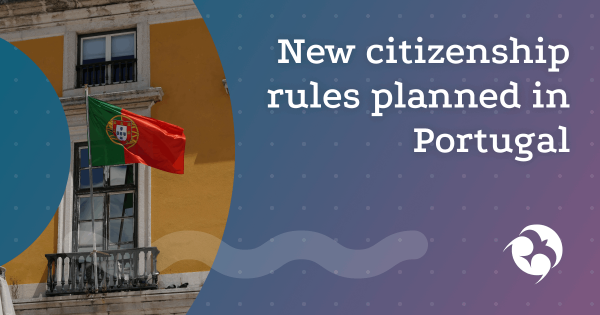Portugal’s political landscape and attitudes towards migrants are changing. The right-wing Chega party has submitted to parliament a bill that could radically change the country’s migration policy. At the same time, a discussion about family reunification is heating up. The figures speak for themselves – Portugal’s immigrant population has grown almost 4 times since 2017.
What Chega offers: new barriers to citizenship
The bill, submitted on June 11, 2025, concerns amendments to the Law on Citizenship (Lei da Nacionalidade). The main innovations will affect 3 key areas.
For children born in Portugal instead of the current requirement of 1 year of legal residence of one parent:
- For citizens of CPLP countries (Portuguese–speaking) – 6 years;
- For the rest – 10 years.
For adults during naturalization:
- Portuguese-speaking citizens: 6 years of residence plus additional conditions;
- The rest: 10 years plus integration and language proficiency tests.
Loss of citizenship:
- Serious crimes with a sentence of more than 3 years;
- Actions that offend national identity.
Family reunification: a new practice
Chega’s petition to suspend family reunification has gained more than 50,000 signatures as of June 2025. The requirement is simple – to freeze this right for 8 years until the situation stabilizes. Minister Antonio Leitan Amaru reacted sharply. He called the information about the mass entry of 500,000 immigrants through family reunification fake news. But he confirmed that the government’s program includes a proposal to change the law so that reunification depends on the possibility of integration of the country.
That’s the reality. Family reunification has long been regulated by a quota system (Sistema de vagas). There is no quota – there is no way to apply. AIMA controls the slots based on an assessment of the country’s capabilities.
Statistics show the scale of the problem:
- Of the 446,000 applications last year, 170,000 were closed due to lack of response from applicants;
- Only 35 applications were rejected;
- Approved applicants are eligible for family reunification.
The government has already approved the revision of the citizenship law “in general terms.” Minister Leitan Amaru stressed that the changes will be included in the government program. The immigration figures in Portugal are impressive. In 2023, the increase was 33.6% to 1,044,606 people with a residence permit. This is the biggest increase in recent years. Plus, about 400,000 people are awaiting status regularization.
Development of the situation: Chega could not agree on changes in migration policy
The bill on citizenship has not even reached the discussion stage. The parliament’s legal services gave such a negative opinion that the draft was stuck at the stage of preliminary verification. Main violations of the Constitution:
- Automatic deprivation of civil rights is contrary to article 30.
- Inequality between naturalized and native-born citizens.
- Vague language about “insulting the nation.”
The family reunion turned out a little better. The draft was allowed to be debated on June 17. But the government categorically opposed the suspension. The project is officially under consideration, but it will not be promoted.
What’s next
The government is preparing its own changes to migration legislation. But it will be an evolution, not a revolution. Planned to:
- Creation of a new UNEF structure within the security police.
- Transfer of authority to extend the residence permit from IRN to AIMA.
- Some increase in the duration of residency.
- Language requirements for the renewal of certain types of permits.
More than 200 NGOs have already signed an open letter defending the right to family reunification. “Reagrupamento é um direito fundamental” – family reunification is a fundamental right. We are waiting for developments.

- We will answer all your questions
- We will help you choose the best option
- We will guide you through every step or do everything for you
It is important to understand that changes in migration legislation can significantly affect plans for obtaining citizenship and family reunification. In such a situation, professional legal support becomes critically important. Our team of migration lawyers will help you understand the current requirements and build the optimal strategy for a specific situation. Leave a request for a consultation. Time is working against those who postpone the resolution of migration issues.













